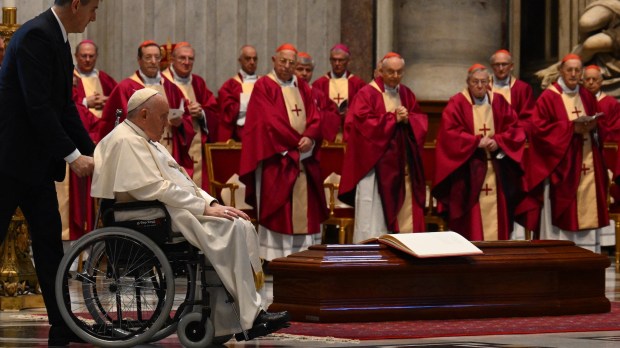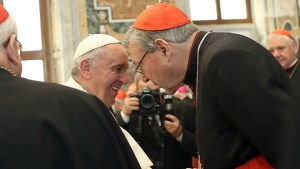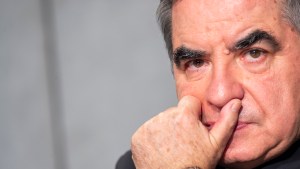As is customary for the funerals of cardinals resident in Rome, the Pope led the final blessing of Cardinal George Pell, during the Mass presided over by Cardinal Giovanni Battista Re, dean of the College of Cardinals, on January 14, 2023. The Australian cardinal died suddenly on the evening of January 10 at the age of 81.
“The unexpected end of the life on earth of Cardinal George Pell has taken us all by surprise,” said Cardinal Re in his homily, referring to the participation of the former Prefect of the Secretariat for the Economy at the funeral Mass of Benedict XVI just days before, on January 5 in St. Peter’s Basilica.
Cardinal Re spoke of Pell’s “unjust and painful condemnation” — the prison sentence suffered by the Australian cardinal, who “spent 404 days in the cells of two high-security prisons, in Melbourne and then in Barwon, including a period of isolation” after being accused of sexual abuse.
“It was an experience of great suffering endured with trust in God’s judgment,” Cardinal Re said, referring to the diary written by Cardinal Pell in prison, which highlighted a “way of accepting even unjust punishment with dignity and inner peace.”
Cardinal Pell was eventually acquitted and released by the Australian High Court of Justice in the spring of 2020.
He was “a man of God and a man of the Church characterized by a deep faith and a great constancy in doctrine, which he always defended without hesitation and with courage, concerned only with being faithful to Christ,” said Cardinal Re.
At the end of the Eucharistic celebration, Pope Francis presided over the rites of the Final Commendation.
A climate of tension
Many followed the celebration with particular attention because of the controversies raised by texts of Cardinal Pell attacking Pope Francis.
Vatican expert Sandro Magister revealed on January 12 that Cardinal Pell was the author of a note describing the pontificate of Pope Francis as “disastrous in many ways: a real catastrophe.”
The text, published in March 2022 under the pseudonym Demos, was an attack on the current pontificate from several angles, from diplomacy to economic management to liturgy.
Corroborating the credibility of the attribution of this text to Cardinal Pell, another article, this time formally signed by the Australian cardinal, was published posthumously by The Spectator on January 11, the day after his death. In it, he attacked the Synod on Synodality as “a toxic nightmare.”
The Vatican has not officially reacted to these criticisms of unprecedented (at least in recent history) severity from a cardinal towards a reigning pontiff. Pope Francis, who called Pell to Rome as the first prefect of the new Secretariat for the Economy instituted in 2014, has referred to Pell as a “genius” because he appreciated his rigor on economic issues, while knowing his reservations on several issues, including ecology and climate change.
The funeral was celebrated in the presence of many cardinals and bishops, including Archbishop Georg Gänswein, former secretary to Benedict XVI and still prefect of the Papal Household.
Now that Benedict XVI has passed, the future of the archbishop is uncertain; he also has published a book highlighting his difficult relationship with Pope Francis.
Cardinal Becciu, Cardinal Pell’s longtime opponent over control of the finances of the Secretariat of State, was also present. Becciu is currently on trial for financial mismanagement.
Cardinal Pell’s body will be repatriated to Australia and buried in the Sydney Cathedral.



